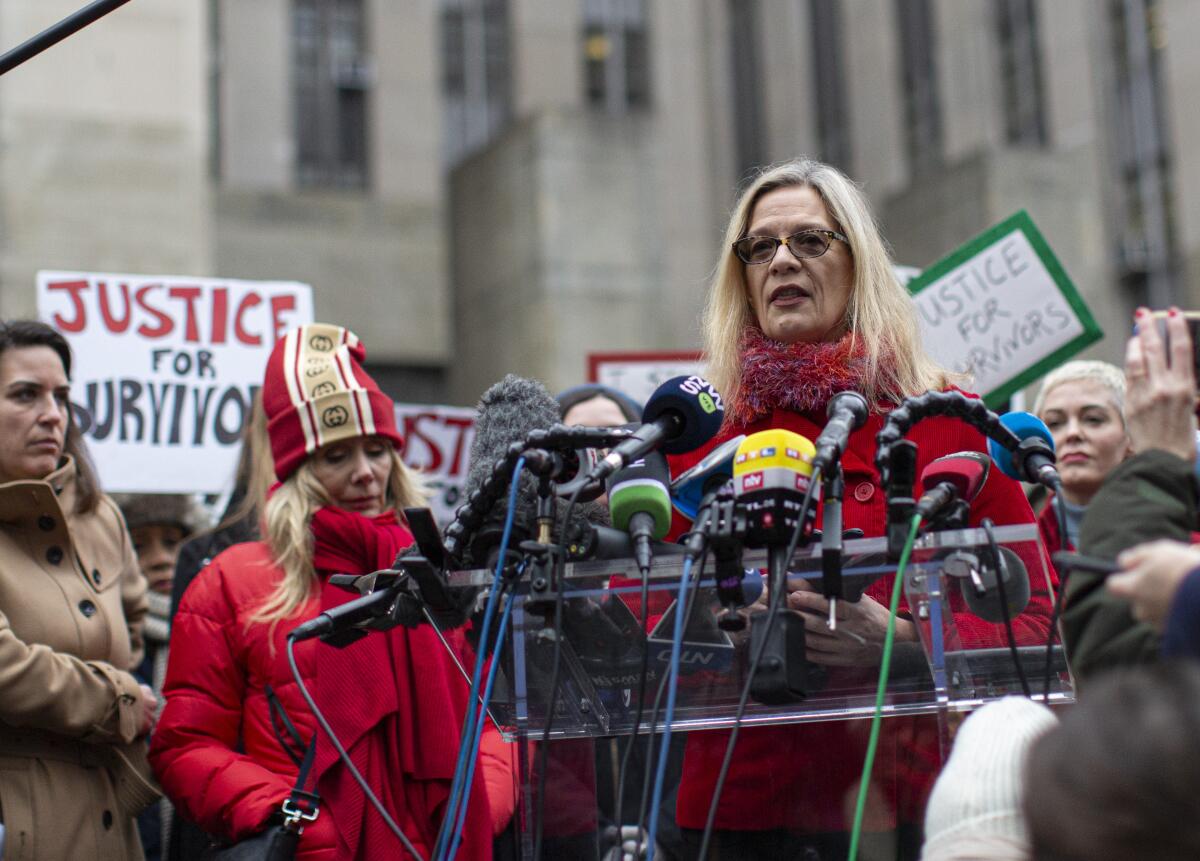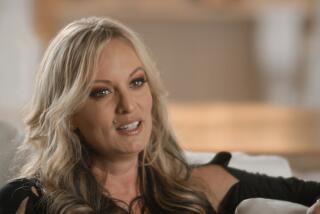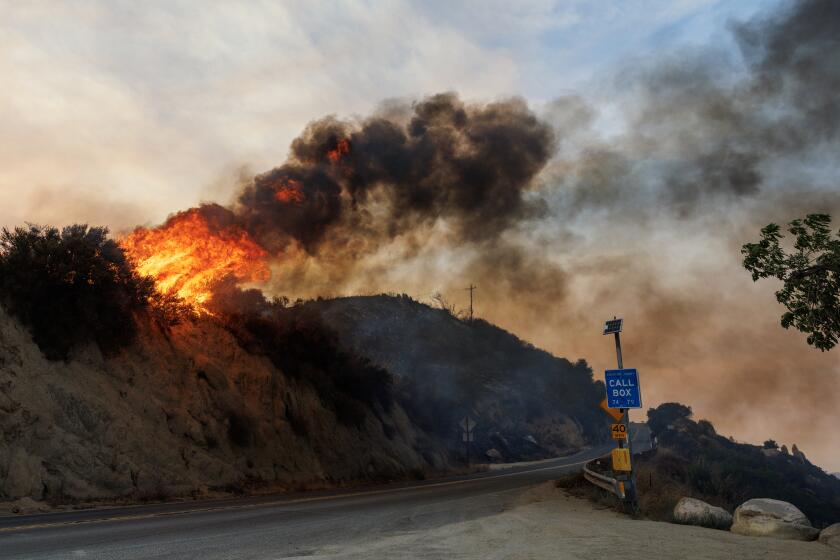Weinstein trial is a milestone for #MeToo and a moment of wrenching truth for survivors

For the past two years, Louise Godbold has been living in a state of heightened tension.
In interview after interview, the former commercial producer has shared what she said happened to her 29 years ago in an empty New York meeting room with Hollywood producer Harvey Weinstein, and then again at the Beverley Hills Hotel. Each retelling surfaced feelings of anxiety and numbness, and at times she questioned whether sharing her story was worth it. Even a friend accused her of making Weinstein a scapegoat for a movement, #MeToo, that they believed had gone too far.
This month Godbold plans to watch as Weinstein is tried in Manhattan on five sex crime charges from two separate incidents in 2006 and 2013. She is one of more than 80 other women who have accused Weinstein of sexual misconduct. Last week, L.A. County prosecutors filed four additional sexual assault charges against Weinstein, who has repeatedly denied any wrongdoing.
“He has to be convicted,” said Godbold, a Los Angeles resident who has spent the last 20 years helping trauma survivors through various social programs. “If not, there’s no morals, there’s no justice.”
The Weinstein revelations were the catalyst for #MeToo, a movement that gave an unprecedented voice to survivors of sexual assault and harassment and provoked a cultural reckoning that had bubbled beneath the surface for decades. The allegations are now set to culminate in a trial that is undoubtedly a landmark case for women’s rights. But despite the potential for a life sentence, advocates contend that the trial is just one milestone in a long crusade for systemic, lasting change.
For survivors such as Godbold, a conviction could mark a turning point and help heal their trauma. An acquittal could confirm their worst fears: That society at large is still not ready to listen.
“It would be devastating if he were to get off,” Godbold said. “It would be a complete affront to every woman and every sexual assault survivor.”
If Weinstein is convicted on the rape and sexual assault charges, the verdict could give fuel to the #MeToo movement, advocates say. Survivors who once felt it too risky to put themselves through a grueling and potentially humiliating process might be emboldened to pursue justice.
The movement fomented a shift in the debate over sexual misconduct that has become much bigger than the mogul himself and the individual stories of those he is accused of harming. Despite this platform, very few survivors see justice served. Out of every 1,000 instances of rape, 13 cases will get referred to a prosecutor and seven will lead to a felony conviction, according to the Rape, Abuse and Incest National Network.
“This trial is critical to show that predators everywhere will be held accountable and that speaking up can bring about real change,” said the Silence Breakers, a group comprised of Weinstein’s accusers, in a statement Friday. “We refuse to be silenced and will continue to speak out until this unrepentant abuser is brought to justice.”
Godbold, who stands among the Silence Breakers, alleges that Weinstein gave her a tour of his Tribeca offices when she was seeking an internship at Miramax in the early 1990s. The producer cornered her in a conference room, grabbed her hand and put it on his crotch, Godbold said. Weinstein later apologized and invited her to a meeting at the Beverly Hills Hotel, where she said he took off his clothes and asked for a massage.
Allegations of misconduct made by Weinstein’s accusers — which range from aggressive romantic overtures to repeated rape — mirror the darkest moments of many survivors, experts say.
Though some will avoid watching the trial unfold for fear of being retraumatized, others will follow it closely, viewing it as a reflection of how others might perceive their own stories of abuse.
“The belief that reports aren’t going to be taken seriously could be confirmed or unconfirmed by this process,” said Emily Dworkin, a psychologist and professor at the University of Washington who studies the mental health effects of sexual assault.
To be sure, the Weinstein trial signals a measure of accountability in a long-standing culture of disbelief — and in the case of Weinstein and other wealthy men, hefty settlements that silence accusers and bar them from pursuing legal action. Still, the trial should not be seen as a neat ending that illustrates the success or failure of the #MeToo movement, but rather a continuum of it, advocates say.
“It would be really great if #MeToo was a ladder and we reached a new rung. But that’s not how movements work,” said Fatima Goss Graves, president and CEO at the National Women’s Law Center and co-founder of the Time’s Up Legal Defense Fund. “In my mind, we have really only begun to scratch the surface.”
Even a conviction could lead to some form of backlash for #MeToo, experts say. “There’s a risk that men in power will say, ‘See, the justice system works. We don’t need to change it,’” said Juliet Williams, a gender studies professor at UCLA.
History shows the incremental nature of progress.
The term “sexual harassment” wasn’t coined until the mid-1970s when the term’s creator, journalist Lin Farley, taught a course at Cornell University on women and work. Many of her female students told stories of being fired or forced to quit a job because they had rejected a boss’ sexual overtures.
“I thought that we needed to have a name for what this phenomenon was,” Farley said during an “On the Media” interview in 2017. “We all needed to be talking about the same thing.”
The term didn’t achieve mainstream recognition until 1991, when Anita Hill testified before Congress about the sexual harassment she said she had experienced while working as an aide for then-Supreme Court nominee Clarence Thomas.
Hill faced intense questioning about her accusations against Thomas from a panel of all-male senators, chaired by presidential candidate Joe Biden. If Thomas’ behavior was so bad, one senator asked, why hadn’t Hill stopped it?
Thomas, who denied the allegations, was confirmed to the U.S. Supreme Court.
History seemed to repeat itself in September 2018, when Christine Blasey Ford testified before the Senate Judiciary Committee that Judge Brett Kavanaugh had sexually assaulted her some 36 years ago when they were each in high school, an allegation he denies. President Trump, who has also been accused of sexual assault, mocked Ford’s testimony. Kavanaugh was confirmed by the Senate days later.
It was a major blow to feminists and survivors, many of whom were retraumatized by the ordeal. Social mores that favored the accused appeared to remain stubbornly intact.
Yet some progress followed each of these events, historians of the gender equality movement contend. In the five years after Hill’s testimony, sexual harassment complaints filed to the Equal Employment Opportunity Commission more than doubled. More women ran for Congress, and many cited Hill and how she was treated as motivation.
In the #MeToo era, those who speak out about being assaulted can count on a vocal community — at least online — to support them. And it is more likely that they will be believed. An NPR-PBS-Marist poll found that 45% of respondents thought Ford was telling the truth, while 33% trusted Kavanaugh. A similar survey in 1991 found that the majority of the public sided with Thomas over Hill.
Many of Weinstein’s accusers are women of privilege, including a number of high-profile actresses, and some advocates question whether the stories would have gripped the public’s attention if that hadn’t been the case.
Kel O’Hara, a fellow at the social justice nonprofit Equal Rights Advocates who is working to expand support for LGBTQ student survivors of gender-based violence and harassment, said the Weinstein trial demonstrates “how bad things have to be in order to build a criminal case.”
“I think it really says something that it took almost 100 women, most with power, to come forward at once to make anything happen. We should celebrate the moment for what it is, but we should also think about how hard it is for people who will never get to this point,” O’Hara said, adding that the marginalized and impoverished are more likely to experience the criminal justice system as an agent of inequity rather than a steward of fairness.
Sexual harassment is a problem that pervades every industry, and survivors are connected by their shared experience, even if their worlds are vastly different. Mily Treviño-Sauceda, the co-founder of Alianza Nacional de Campesinas, a group that advocates for the rights of female farmworkers, noted that some of the women she works with will see their own traumas in the testimonies of Weinstein’s accusers.
Farmworkers are much more likely to be victims of gender discrimination and sexual harassment. Most do not report sexual misconduct for fear of losing their jobs, or because they are undocumented and worry they’ll be deported if they contact the authorities.
“If those women lose and they have those kind of privileges,” Treviño-Sauceda said, “what is the statement for women who don’t have that?”
Even women with power who testify at sexual assault trials that yield convictions still face victim blaming, the practice of questioning what a victim could have done differently to prevent a crime. In the 2018 retrial of Bill Cosby, for example, the actor’s defense attorneys characterized one of his accusers as a promiscuous social climber.
“She wanted to be a star,” defense attorney Kathleen Bliss said of Heidi Thomas, who said Cosby drugged her and tried to force her into oral sex in 1984. “She’s living the dream now.”
Despite the public shaming of his accusers, Cosby was found guilty of three counts of aggravated indecent assault and was sentenced to three to 10 years in state prison — a boon for the #MeToo movement.
In a recent interview with the Los Angeles Times, Hill noted that sexual harassment and abuse is “not just an issue of individual behavior.”
“It’s a problem of systems, it’s a problem with culture, which have to come together to support this kind of behavior,” she said. “In that sense, the work is beginning to happen. And the Weinstein trial is evidence that the systems are coming together to address the problem instead of simply supporting it.”
Hill now leads the Hollywood Commission, an organization formed in response to #MeToo that aims to eradicate sexual harassment in the entertainment industry. A professor of social policy and law, Hill said that the criminal justice system should be seen as the “last resort” for addressing these issues.
It is still too early to say whether the movement will make an enduring impression on the law, policy and the justice system, which tend to lag behind even major cultural shifts, said Williams, the gender studies professor. The civil rights and gay rights movements serve as lessons; decades of outcry and grass-roots organizing preceded meaningful institutional change.
“For #MeToo to have a lasting impact,” Williams said, “we will have to come up with demands and reforms that have a much, much broader reach.”
But the Weinstein trial will undoubtedly offer clues, she added, to just how much work is left to be done.
More to Read
Sign up for Essential California
The most important California stories and recommendations in your inbox every morning.
You may occasionally receive promotional content from the Los Angeles Times.











